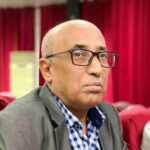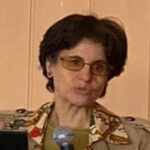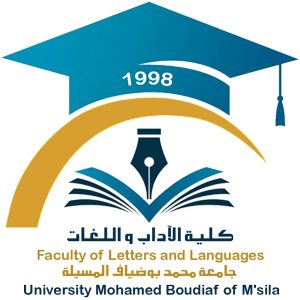
Head of the formation field in Arabic Language and Literature
Pr . abbas benyahia
abbas.benyahia@univ-msila.dz

Head of the formation field in Foreign literatures and languages
Pr. fouzia amrouche
fouzia.amrouche@univ-msila.dz
Internal Regulations of the Training Field Council
The Training Field Council: For the Arabic Language and Literature at the Faculty of Arts and Languages:
By virtue of Law No. 05-99 dated April 4, 1999, concerning the guiding law of higher education, as amended and supplemented By virtue of Executive Decree No. 10-38 dated January 25, 2010, concerning the establishment of the University of M’sila, as amended and supplemented By virtue of Executive Decree No. 08-130 dated May 3, 2008, concerning the special basic law for the research professor, By virtue of Executive Decree No. 10-265 dated August 19, 2008, concerning the study system for obtaining the bachelor’s degree, master’s degree, and doctorate degree, By virtue of Decision No. 458 dated December 18, 2012, concerning the establishment of the departments that make up the Faculty of Arts and Languages at the University of M’sila, By virtue of the joint ministerial decision dated May 24, 2010, specifying the higher positions for the research professor ranks, Based on the minutes of the meeting held at the Faculty of Arts and Social Sciences at the University of M’sila on April 10, 2012, regarding the establishment of the Training Field Council,
It is decided to establish the following internal regulations:
Purpose of the Internal Regulations
This internal regulation aims to determine the procedures for the operation of the Faculty Council and organize its meetings based on the applicable laws and cannot contradict them in any way.
Council’s Competencies
Article 02: The Training Field Council provides opinions and recommendations on the matters assigned to the head of the training field team, which are defined as follows:
- Proposing the educational program for training paths
- Preparing pathways between training paths to allow for gradual student orientation
- Developing consistent pedagogical curricula
- Organizing the evaluation of training and teaching forms
- Ensuring the coherence of paths and expressing an opinion on the feasibility or modification of training paths
- Ensuring the overall coherence of internships stipulated in the training
The council may also address any other pedagogical issues presented by the Dean of the Faculty.
Educational Program for Training Paths
The Training Field Council studies and provides opinions and recommendations on the educational program for the training paths in the department. To this end, the council must consider the specifics of the department, faculty, and university regarding pedagogical and scientific capacities and national orientations in this field.
Pathways Between Training Paths for Gradual Student Orientation
The Training Field Council studies and provides opinions and recommendations on projects for creating pathways between training paths to allow for gradual student orientation in line with the objectives of the department, faculty, and university.
Developing Consistent Pedagogical Curricula
The Training Field Council studies and provides opinions and recommendations on proposed pedagogical curricula projects from the departments, taking into account the alignment of department offerings with the general orientations of the faculty and university. The council also reviews the current training summaries and provides opinions and recommendations on their future.
Organizing the Evaluation of Training and Teaching Forms
The Training Field Council studies and provides opinions and recommendations on training offers, considering their alignment with the annual and phased plans in the faculty and university, particularly:
- Opening new specializations according to applicable laws
- The composition of the specialization team concerning their scientific and technical qualifications
- Possible contributions from external entities in the proposed training offers (university and non-university institutions, research centers, etc.)
- The training program through research and for research outlined in the project (concerning the doctorate).
Coherence of Paths and Opinion on the Feasibility or Modification of Training Paths
The Training Field Council studies and provides opinions and recommendations on the coherence of paths and the feasibility or modification of training paths. It also gives opinions and recommendations on the requalification, freezing, or closing of ongoing training.
Overall Coherence of Internships Stipulated in Training
The Training Field Council studies and provides opinions and recommendations on the internship process stipulated in the training, considering the type of receiving institutions, their scientific and technical qualifications, and the alignment of the proposed internship topics with the ongoing specializations.
Internal Organization of the Council
Council President
Article 03: The head of the training field performs the following:
- Determines, in agreement with the Dean of the Faculty, the schedule of regular meetings at the beginning of each academic year before the Faculty Scientific Council convenes.
- Determines, in consultation with the Dean or Vice Dean responsible for studies and student-related matters, the agenda of meetings
- Calls council members for regular and extraordinary sessions
- Manages discussions within the council and ensures the proper conduct of its sessions
- Ensures compliance with the council’s internal regulations
- Signs the minutes of sessions that include the opinions and recommendations adopted by the council.
Secretariat
Article 04: The Secretariat of the Training Field Council prepares council meetings and collects the necessary files and documents to study the points listed on the agenda. It also follows up on the studied files. The Vice Dean responsible for studies and student-related matters ensures the secretariat of the council.
Invitations
Article 05: The Secretariat of the Training Field Council sends invitations to council members fifteen days before the scheduled meeting date, attaching the agenda of the planned session and the necessary documents when needed.
Agenda
Article 06: The agenda includes issues within the council’s competencies proposed by its president in coordination with the Vice Dean of the Faculty. Additionally, any council member can propose additional points to the agenda if approved by two-thirds (2/3) of the attendees.
The agenda is approved at the beginning of each session.
Quorum
Article 07: The Training Field Council can start deliberations when the quorum is met, i.e., two-thirds (2/3) of its members are present. If the quorum is not met, a record specifying the deficiencies and the next meeting date is documented. In this case, the council can proceed with deliberations regardless of the number of attendees.
Attendance at Meetings
Article 08: Council members are required to attend all regular and extraordinary meetings. Absences must be justified by a letter addressed to the Dean of the Faculty with the knowledge of the council president. Legal procedures are taken in case of an unjustified absence.
Article 09: In case of resignation, abandonment, or dismissal of a council member, they are replaced immediately according to the legally defined procedures.
Article 10: In the absence of the president of the Training Field Council, the Dean of the Faculty can appoint an acting president.
Meetings
Article 11: The Training Field Council meets in regular sessions at the invitation of its president three times a year, in November, March, and June of each academic year. The meeting can be advanced or postponed for up to two weeks if needed. The council can meet in extraordinary sessions if necessary, at the invitation of its president, the Dean of the Faculty, or at the request of two-thirds (2/3) of its members.
Deliberations
Article 12: The Training Field Council’s decisions are taken and approved by the majority of the attendees’ votes. For the deliberations to be valid, a simple majority (half +1) must be present. In case of a tie, the president’s vote is decisive.
Article 13: The Training Field Council’s deliberations proceed with a scientific vision and a logical approach to the discussed issues. The expressed opinions and provided recommendations must reflect an objective and reasonable perspective.
Article 14: The members of the Training Field Council must respect the confidentiality of the deliberations and not disclose the files and information they might come across during the deliberations.
Article 15: Council members must maintain absolute confidentiality regarding the individual opinions and positions expressed during the deliberations.
Article 16: The Training Field Council can consult or invite any person from within or outside the university to assist in its work due to their knowledge or interest in higher education and scientific research. They can provide their opinions verbally before the council or in writing for presentation to it.
Minutes
Article 17: The opinions and recommendations of the Training Field Council are recorded in a numbered and endorsed register by the Dean of the Faculty. These opinions and recommendations are subject to a minute signed by all council members.
Article 18: The Vice Dean responsible for studies and student-related matters and the president of the Training Field Council are responsible for the final drafting of the meeting minutes, which are recorded in the register.
Article 19: The Secretariat of the Training Field Council sends a copy of the meeting minutes within fifteen (15) days following the meeting date for regular sessions and seven (07) days for extraordinary sessions to all council members. The Dean of the Faculty sends a copy to the university director.
Substitution for Departmental Training Councils
Article 20: The Training Field Council can substitute for the departmental training councils if their sessions cannot be held.
Compliance with the Internal Regulations of the Training Field Council for the Faculty in the Departmental Training Councils
Article 21: The departmental training councils must comply with the content of the internal regulations of the Training Field Council for the faculty.
Review of the Internal Regulations of the Training Field Council for the Faculty
Article 22: The president of the Training Field Council, the Dean of the Faculty, or two-thirds (2/3) of the members have the right to request a review of certain articles of the council’s internal regulations after providing justifications.
Vacancy of the Position of President of the Training Field Council
Article 23: In case of the vacancy of the president’s position of the Training Field Council for the faculty, the Dean appoints an acting president to manage the sessions until a new official is appointed.
Effectiveness of the Internal Regulations of the Training Field Council
Article 24: The internal regulations of the council become effective after approval by the Training Field Council for the faculty, which occurred on

